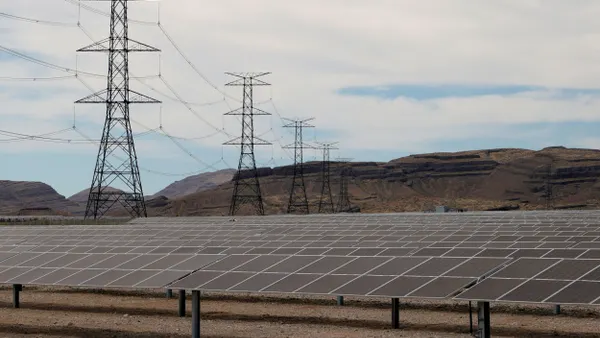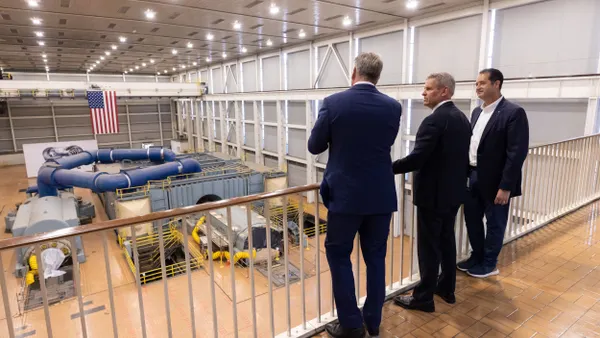Dive Brief:
-
The California Independent System Operator (CAISO) wants state regulators to reconsider a decision on resource adequacy (RA) import rules, saying in a Nov. 18 application for rehearing that the clarified rules create significant uncertainty in energy and capacity markets.
-
The decision, approved by the California Public Utilities Commission (CPUC) in October, requires non-resource-specific RA imports to self-schedule into the CAISO market. But according to CAISO and other parties, like the California Community Choice Association (CalCCA), it modifies RA rules without providing enough evidence.
-
CAISO also identified a need to reform the RA program in its 2020 three-year policy initiatives roadmap, issued on Nov. 25, "necessitated by increasing retirements and tightening dispatchable capacity." Comments on the roadmap are due Dec. 9.
Dive Insight:
California's RA program was created in the aftermath of the state's 2000-2001 energy crisis on the basic concept of demonstrating capacity on a year-ahead basis. But in the last three years, changes in the state's energy landscape have caused wrinkles in the RA framework.
The first big change is the increasing share of renewables — as intermittent resources grow on the grid, the CPUC is grappling with how to ensure load-serving entities meet RA standards for all hours of the day. A second change is the transition from a system with investor-owned utilities as the predominant buyer of electricity to one where load is shifting to community choice aggregators and direct access providers.
The CPUC passed its October decision "affirming" RA import rules within this context. One aspect of the rule that the agency clarified was that non-resource-specific RA imports — imports that do not specify what their power generation is — would have to self-schedule into the CAISO market based on the timeframes in their contracts.
Essentially, the generator, rather than CAISO, is required to state when their resources will be available. The CPUC did not place a similar requirement on resource-specific imports, which they said "do not carry the same concerns about speculative supply as with non-resource-specific imports."
Meanwhile, the CAISO is also focusing on enhancing RA rules. In 2020, the operator is exploring options to review maximum import capability calculation and allocation, as well as local capacity needs for slow demand response resources, according to its policy roadmap.
In its application to rehear the CPUC's decision, CAISO argued that the "clarification" on self-scheduling amounted to modifying existing RA import rules, since 2004 and 2005 decisions on the matter did not distinguish between kinds of RA imports or required self-scheduling. The changes are significant and not bolstered by evidence, according to CAISO.
The system operator urged the CPUC to "re-open the record to establish resource adequacy import rules that are supported by the record in this proceeding."
"The simplest way to think about it would be the CPUC wants the imports to be what's called self-scheduled and the ISO would like to give imports the flexibility not to flow during certain periods," Frank Wolak, director of the Program on Energy and Sustainable Development at Stanford University and former chair of CAISO's Market Surveillance Committee, told Utility Dive.
CAISO has filed applications to rehear CPUC decisions in the past, but "it is not their standard default," Michael Colvin, director of the Environmental Defense Fund's California energy program and former advisor at the CPUC, told Utility Dive. "So the very fact that they submitted an application for rehearing is by its nature eyebrow raise-worthy."
Colvin noted that CAISO's main job is to balance California's grid.
"That's how I read [their application] — that they are trying to preserve their operational flexibility as the grid operator to be able to do their job," he said.
CCA group also questions RA decision
CAISO wasn't alone in asking for a rehearing of the decision. CalCCA filed an application of its own, as well as a motion to stay the decision on Oct. 24, saying it lacked clarity and would cause confusion in the RA process.
"It appears that in order to comply with the requirement detailed above, the generator supplying import RA will be required to self-schedule energy as a price taker in the CAISO market during some yet-unclear period," CalCCA said in its filing. The requirements could jeopardize existing community choice aggregator RA contracts weeks before RA compliance showings scheduled for Oct. 31 and Nov. 17, the group added.
CalCCA members would either need to renegotiate existing 2020 import RA contracts totaling $47 million at the last minute or replace them, and either option would eventually disrupt the market and increase prices for ratepayers, the association said. CalCCA estimates that negotiating replacements to the contracts would add up to $87 million to customer costs.
In its Oct. 24 application for rehearing, CalCCA said the modified import rules would create barriers for out-of-state generators to participate in California's RA market. The association also argued that requiring imports to self-schedule appears to be an attempt at "controlling prices for import RA rather than ensuring availability."
"Controlling pricing in the energy market, however, is not the Commission's domain but a matter of [Federal Energy Regulatory Commission] jurisdiction," according to CalCCA.
"We absolutely understand [the CPUC's] role and that rules will change," CalCCA Executive Director Beth Vaughan told Utility Dive. But the issue, she said, was that the agency was making a material change to the rules just two or three weeks out from the deadline for year-ahead RA showings — one that would require contract renegotiations for CCAs and cost increases for ratepayers. With major changes like this, the CPUC should grandfather existing contracts and phase out the old rules slowly, she added.
The Western Power Trading Forum (WPTF) supported CalCCA's application in a Nov. 8 filing, saying that requiring suppliers to self-schedule into the CAISO market could artificially suppress energy prices and simultaneously increase RA prices.
"Indeed, the Commission is basically giving FERC no choice but to assert jurisdiction, and it is very likely the self-scheduling requirement will be invalidated on federal preemption grounds," WPTF said.













